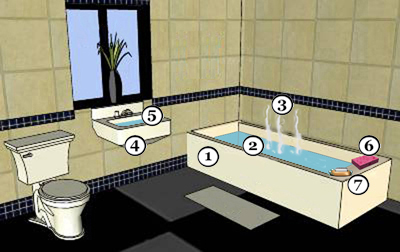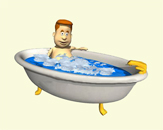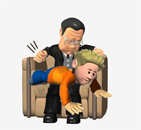STEP 12
Vocabulary
![]() Read and memorize this nouns and adjectives.
Read and memorize this nouns and adjectives.
Nouns
Basin |
 |
Bath |
 |
Drain |
 |
Drop |
 |
Ear |
 |
Kick |
 |
Laugh |
 |
Soap |
 |
Sponge |
 |
Steam |
 |
Waste |
 |
Water |
 |
Argument |
|
Blow |
|
Competition |
|
Hour 1 |
|
Minute |
|
Song |
|
Sound |
|
Voice |
|
|
|
Adjectives
Angry
Quiet - loud
Waiting
Warm - Cold
Structure words
Again
Only
Still
1 As this word begins with an vowel-sound (the 'h' being silent), the form an is used with it, in accordance with the rule.
Why
- Pronouns
The numeral “one”, which was introduced in the last Step, has an important special use as a pronoun, in addition to its ordinary numerical use. It stand for a noun naming a countable which has been used just previously (to avoid repetition), or for one which is clearly implied, and in this use adds the 's' of the plural and becomes ones when the noun for which it stands is plural.
- I will go to the back door. The font one is shut.
- This building is a school and that (one) 2 is a hospital.
- You may go up a tree but do not go up that high one.
- Do not take my sponge. It is the one in the basin.
- The old man has some teeth but every one (of them) is bad.
- Are these girls the ones with the beautiful voices?
- Do not put these red apples with those green ones.
- Give me a red apple. Green ones are acid.
(Note that the singular every one is more emphatic than the plural pronoun all.)
2 Since this and that have a pronoun use, it is optional whether one is put in after them.
In this special pronoun use, one can only be used with a(n), no some, or a possessive or numeral adjective when these are followed by some other adjective.
- Has he a new house or an old one?
- The water goes out of the bath very slowly because the drain is a narrow one.
- She will give the boy a new sponge and put his old one on the fire.
- Here are the apples. We have no red ones.
- Some green ones seem acid to me.
- Take another one.
In addition, one may take the place of a(n) and a noun.
- The cook has all the basins. Please get one (a basic) from her.
That (those) is always used instead of the one(s) before of as a sign of ownership.
- The voice is that (the voice) of my mother.
- My hands are warm but those of my sister are cold.
- Operators
In addition to its normal use as an operator and its auxiliary use in negative sentences, do may be used as a substitute for an operator or for an operator and its objects, etc., used just previously. This is very like the use of a pronoun in place of a noun or a noun phrase; it avoids repetition and makes the sentence shorter.
- Make no sound till I do . (make a sound)
- My son will go if the others do. (go)
“Do” cannot be used as a substitute operator for be.
- Adverbs
The adverb of degree “only” comes immediately before the part of the sentence which it qualifies. In addition to what is usually qualified an adverb, it may qualify a noun or pronoun, in which case it precedes a, the, or any other qualifier.
- Arguments give me no pleasure, they only make me angry.
- There is only water in the pot.
- Only a boy is in the store.
- The house has only one door.
- The servant will come. She is only late.
- The manager is there only in the morning.
- He will take the tooth out only if it is bad.
- The servant will come. She is only late.
- The manager is there only in the morning.
- He will take the teeth out only if it is bad.
Though “still” may be put at the end of the statement it is generally given some other position: In simple tenses, it may be put before the operator.
- The water still seems cold.
- Arguments still make him angry.
- We still have no soap.
When the operator is “be”, however, “still” may come after it.
- He is still here.
- They are still waiting.
When an auxiliary is used, “still” l may come after it before the completing operator.
- Your friend will still be waiting.
- The store may still have some sponges.
In questions, “still” may come after the subject.
- Has he still a pain?
- Is she still angry?
- Do these songs still give you pleasure?
- Will the water still be warm?
In negative statements and questions, however, the sense may affect the position of still.
- He is not still here. (no longer here)
- He is still not here. (not here yet)
- May I not still go? (Is the permission withdrawn?)
- May I still not go? (Is the permission still refused?)
“Why” is a relative adverb, having the sense of 'the reason for which.'
- The window is shut. That is why the room is full of steam.
- The girl does no work. That is why her father is angry.
- Is that why you will not be there?
“Again” usually comes at the end of the statement it qualifies.
- You will not see that advertisement again.
- He is putting his instruments in the drawer again.
- When they come again, you will not be here.
Adjectives which indicate position in space or time do not take the -ly ending but may be used adverbially without any change of form.
- You may go up the tree but do not go very high.
- The birds will not come low if they see us.
- Joan has her meal early.
- The trains go from this station quite late.
- ADVERBIAL TIME PHRASES
The time qualification of a statement is frequently given by an adverbial phrase beginning with at, on, or in, and it is important to be clear how these are used.
At: Is used before names of points of time. Time, in addition to meaning of “duration or period”, means 'point of time'; minute, in addition to meaning '60 seconds', means 'exact point of time, moment'.
- I am in pain at this minute.
- At that time he will be in his bath.
Is: Is used with the sense 'in the course of' before names of stretches of time, including time itself. But note that In this sense It is used with morning, night, and day only when these are used generally, in which case they must be preceded by the. The idiom at night (see Step 6) is the general parallel of in the morning, in the day. In the night is restricted to the middle of the night.
- She does no work in the day.
- The men may get out of the prison in the night.
- In the time before my train goes, I will have a meal.
ON is used before morning, night, and day, when these refer to some particular morning, etc., that is, when they are qualified by anything but the alone. On is frequently omitted when the time-word is qualified by "the" or a non-descriptive adjective.
- My mother does not go out on dark nights.
- (On) some mornings he is late.
- Do not come (on) that night because we will be out.
- I will be ready early (on) the day when I go to the hospital.
The use of these prepositions in connection with time is closely parallel to their use in connection with space. When, therefore, you are in doubt about which to select, remember that we talk of a thing as being at a point, on a line, and in a circle.
AT THE BATHROOM DOOR
[The sound of water going into the bath comes from the bathroom. Bob is waiting outside the bathroom door, which is shut.]
Bob: Is that you, Jim?
Jim: Yes.
Bob: Are you in the bath?
Jim: No, I am taking off my things. My bath is not quite ready.
Bob: Please be quick because I am waiting, and do not take all the warm water.
Jim: I am only letting in some cold water. The water is very warm this morning. My bath is ready. I am getting into it.
[Some time goes by. Bob is still waiting. The sound of a song comes to his ears. Jim has a loud voice but it is not beautiful. Bob give the door a blow.]
Jim: Are you still there?
Bob [getting angry]: I will not go back to bed at this time of the day. I will be late for my work again if I do not get my bath quickly.
Jim: But I am not making you late. You will get a bath before I do if you get up before I do. If you are late, that is only because you get up late.
Bob: But the water is not warm early in the morning. That is why I do not get up early. And this is not your time for a bath. It is my time. You are the one who is late. This competition for the bath every morning makes me angry.
Jim: This argument which we have every morning is a great waste of time. Be quiet for a minute and let me have my bath. Go and get a new bit of soap while you are waiting. This one is very small.
Bob: If you keep me waiting when I get back there will be trouble.
[Bob goes to his bedroom and gets some soap. When he comes back his friend is still in the bathroom and loud sounds are coming from the bath. Bob gives the door a kick again.
Jim : Are you back ? You seem angry with me. Do not do that again. You may make a hole in the door.
Bob: [angrily]: Are you coming out? If you do not, I will come in. You take almost an hour for your bath. [He gives the door a kick again.]
Jim: I am letting the water out. I am almost ready.
[There is the sound of water going down the drain. Another minute goes by. Bob gives the door a pull. Jim suddenly gives a push from the other side and gets it open. Bob goes down on his back and Jim comes out. He sees his friend and gives a laugh.]
Jim [brightly]: Good morning! Your bath is ready and it is a good one. Be quick. [He takes up a sponge and a bit of soap which is on the floor and gives them to Bob.] Here are your sponge and your soap.
[Jim goes to his room. Bob gets up in pain and goes into the bathroom. It is full of steam and there is water everywhere. Bob gets the window open. He goes to the bath and puts his hand in the water. It is almost cold. He takes his hand out quickly and some drops of water go on the floor. Angrily, he lets out the water, takes his soap and sponge to the basin, and has a quick wash.]
NOTES
![]() Read Carefully, this are some sentences of the text, and here is the explanation form them.
Read Carefully, this are some sentences of the text, and here is the explanation form them.
Bathroom: Room for bathing in.
Outside the bathroom door: Outside is here a preposition. Note that inside may be used in a similar way.
My bath is not quite ready: The bath, here, is the bath-water in the bath.
Goes by: When one passes a thing one goes by (or near) it and so going by a thing has come to have the sense of 'going past' it. In this sense, by may be used adverbially, so go by becomes simply 'pass' and can, by an easy metaphor, be used of the passage of time.
Having your bath: Having a bath: 'bathing', bath here being the process for which a bath is used.
We have seen that three different operators, do, give, and now have, are used with nouns naming actions to indicate the performing of them. Why do we do work, give a cry, and have a bath? In general, the names of acts which produce something take do, those in which a single bodily exertion is directed to something outside ourselves take give, and those which are chiefly thought of as something experienced by the person performing them take have. These are not, however, the only operators used with names of actions, and this rule is only a rough guide. It is important to note every example of this kind which we come across, as the uses are, for the most part, fixed.
In a minute: When in is used before a time-word qualified by a(n) or an adjective of quantity, it commonly indicates either the time taken by some happening or the time elapsing before it. Here, I will be out in a minute = 'I will be out at the end of a minute'. On the other hand, I have my bath in an hour = 'The process of having my bath takes an hour'. The general sense of what is being said makes clear which meaning of in is intended. -- Minute is frequently used in the loose sense of a very short time.
Go back to bed : Sometimes, when we use the word bed, we are thinking of the state of sleeping or resting associated with beds rather than of the actual bed itself. In such cases, bed is used without a, the, or any other pointing word in front of it.
Get my bath quickly: Quickly here means 'promptly, soon'.
Get up: Get up is used either for 'rise from ones seat etc.' (as we have seen in Step 11) or for 'rise from one's bed', the circumstances, as here, making clear what is meant. To be up is the opposite of to be in bed.
This argument which we have : Have is the operator used with argument. Compare with have a bath.
Be quiet : Quiet may mean either 'the opposite of loud or noisy' or 'silent'. Here clearly, it means the latter.
For a minute : For is used before time-words in the sense of 'during'.
Angry with me : Note that with is used after angry to point to the person or persons towards whom anger is felt.
Angrily : When the “-ly” adverbial ending is added to an adjective ending in y, the “y” is changed to “I”.
Take almost an hour : Note this use of take, in the sense of 'use up' or 'require', with time-words. Almost and quite, like only, may come before nouns.
Gives a laugh : Compare with gives a cry in the last Step. Laugh is another example of an action word which may be used with give in the sense of 'emit'.
Brightly: Cheerfully. Note that this sense comes from an expanded sense of bright at cheerful'. Brightly may also correspond with the root sense of bright, that is, it may mean 'brilliantly, with a bright effect'.
Everywhere: In (or to) every place. Similar compounds are formed with some and where (Put this somewhere) and no and where (I will go nowhere).
Exercises

1. What is this a picture of? Name the things which are numbered.
1.-
2.-
3.-
4.-
5.-
6.-
2. Answer in Basic:
(a) What is in the bath?
A:
(b) Is there warm water in the bath and in the basin?
A:
(c) What is the sign that the water in the bath is warm?
A:
(d) What do we see going into the basin?
A:
(e) Why is no steam coming from the basin?
A:
(f) What do you see which has holes in it and where is it?
A:
(g) What is on the side of the bath?
A:
(h) Where is the water going to in the small picture at the top?
A:
3. Fill in the blanks with the right preposition:
(a) _____ some night the sounds are very loud.
(b) He may have some pain _____ the day.
(c) He will take my other tooth out _____ another day.
(d) If you come again ___ an hour, I will still be waiting.
(e) _____ this minute. Mary is having her bath.
(f) The water is warm _____ the morning and cold _____ night.
(g) I will be in the bathroom _____ quite an hour before I am ready.
(h) The servant will be at the station before the time _____ which the train comes.





- Describe the actions which are taking place in the above pictures.
(a)
(b)
(c)
(d)
(e)
5. Fill in the blanks with the words again, only, still.
(a) He is an old man but he _____ gets up early.
(b) If you give a laugh _____, I will be angry.
(c) She will put the water in a pot on the fire and make it warm _____.
(d) There is some liquid on the floor but it is _____ a drop.
(e) Are you _____ waiting?
(f) He is not giving his hands a wash. He is _____ putting them in water.
6. Using the word why, make a statement referring to each of the following as a reason for some consequences:
(a) She has a loud voice.
A:
(b) The water is very warm.
A:
(c) The song is a beautiful one.
A:
(d) There is great competition for the bath.
A:
7. Substitute does for a phrase in each of these sentences:
(a) Our servant gets up in the morning before we get up.
A:
(b) Steam may come out of the hole. If it comes out of the hole it will make a sound.
A:
(c) When I keep her waiting she is angry, but when you keep her waiting she only gives a laugh.
A:
8. Answer in Basic:
(a) What is Jim doing when Bob first comes to the bathroom door?
A:
(b) What is Jim's voice like?
A:
(c) Why doesn't Bob get up before Jim?
A:
(d) What effects does the competition for the bath have on Bob?
A:
(e) What does Jim make Bob do while he is waiting?
A:
(f) What does Bob do when he comes back from the bedroom?
A:
(g) Why does Jim give a laugh when he comes out of the bathroom?
A:
(h) What is the condition of the bathroom when Bob get into it?
A:
(i) Give an account of what Bob does in the bathroom.
A:




